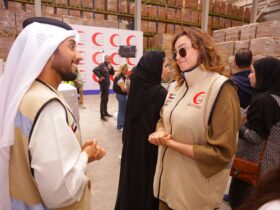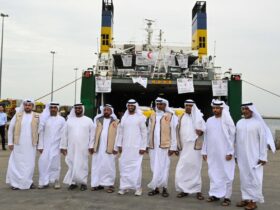Dubai – Masaader News
The jobs challenges facing developing countries are immense. More than 200 million people worldwide—disproportionately youth—are unemployed. Another 2 billion working age adults—mostly women—remain outside the workforce. Barriers to employment must be removed to ensure inclusive opportunities in the labor market for often disadvantaged groups: women, youth, and the poorest. On top of this, developing countries will need to create 600 million additional jobs by 2030, just to keep up with population growth. And, to capture the benefits of technological advances, countries will need to ensure that their citizens have the education and skills to succeed in the jobs of a modern economy. Success in these areas is critical. Good jobs give people the means to lift themselves out of poverty, which in turn helps make countries more stable economically and socially, and ultimately benefits global economic growth.
Approach
The jobs agenda is a top priority for the World Bank. Improving financial access, strengthening skills training, supporting a strong private sector, and building sustainable infrastructure helps connect people to job opportunities that can help end poverty and promote economic and social stability within countries and across borders. The World Bank supports private sector-led growth to create jobs and works with countries to design and implement multi-sector job strategies and mobilize global knowledge to address the jobs challenges they face. The World Bank’s approach to the jobs challenge includes:
Building Knowledge. The World Bank helps countries identify key challenges they face in their labor markets through jobs diagnostics. Using macro, household, and firm data, the bank helps to ensure governments focus on the fundamentals, drill down to the critical sectors and regions necessary to create job markets that benefit the poor, and help create the evidence base needed to develop policies for better and more inclusive jobs in today as well as helping to prepare for the future.
Finding Solutions. The World Bank helps to build jobs strategies to address countries’ jobs challenges. Governments need policies to help the private sector create more jobs, invest in infrastructure such as transport and information and communications technologies, and improve market linkages to connect people to jobs and markets. Key interventions supported by the World Bank include: macro and regulatory policies; labor regulations and active labor market programs; and targeted programs to create jobs by addressing sectoral and regional needs.
Financing Programs. To support countries in implementing these jobs strategies, the World Bank provides lending for operations and reforms, at national or regional levels. These can involve programs that promote entrepreneurship or connect small informal producers to formal value chains, the development of small and medium enterprises, and, more broadly, investments in infrastructure and information and communications technology.
Results
Projects supported by the International Bank for Reconstruction and Development (IBRD) target many aspects of the jobs challenge. Below are recent project results from around the world.
In many countries, workers from rural areas are drawn more and more to the opportunities in cities. But often, they wind up working the most menial and lowest-paying jobs, due to low educational levels and a lack of relevant skills. Supporting the ambitions of workers in rural areas and improving their skills helps them to develop greater career opportunities in more skilled jobs, making them better fits for employment demands of today’s labor markets and growing their income prospects. Starting in 2009, a $50 million IBRD loan for the Rural Migrant Skills Development Project helped China to provide skills training to more than 522,000 young people and employment services over 4.2 million job seekers. The project also financed investments in vocational education and training schools in rural areas, bolstering collaboration between vocational schools and businesses, and helping over 308,000 graduates find jobs.
In times of economic downturns or crisis, the poor are often hit hard, particularly if they lose their job and have difficulties regaining employment, even as economic recovery takes place. Countries can help mitigate these effects through the development of social protection systems that can help move people back into employment and earning an income. In Argentina, which faced an economic crisis in the early 2000’s and then again during the global financial crisis, a $450 million IBRD loan for the Basic Protection Project strengthened the country’s Employment Benefits and Training Program, which expanded the number of beneficiaries served from 78,500 in 2008 to more than 106,000 in 2015 and doubled the annual number of program graduates into formal employment between 2008-15 to more than 15,000 people.
The lack of a skilled workforce is a key challenge facing many developing countries across many sectors, including Information Technology (IT). Programming and engineering are not always popular careers, and a gap often exists between what the IT industry requires and the graduates that universities produce. Because technology advances faster than training, skills development remains an issue in IT preparation programs around the globe. In Mexico, to move the country toward a knowledge-based economy, an $80 million IBRD loan financed the Information Technology Development Project. Between 2008-15, more than 102,000 trainees received international standards certifications; approximately 40,000 students moved on to new IT jobs after attending training programs; and trainees reported receiving higher incomes and promotions following the training.
Micro and small enterprises (MSEs) play a key role in employment generation in many middle-income countries. Helping MSEs to receive financing and credit can help expand their operations and create new job opportunities. In Egypt, small, young enterprises are the main source of new jobs. They account for more than 98% of businesses, generate more than 85% of employment in the non-agriculture private sector and 40% of total employment. In 2014, IBRD supported the $300 million Promoting Innovation for Inclusive Financial Access Project to help channel venture capital to start-ups and micro enterprises, with a special focus on women and youths. To date, more than 63,000 businesses have received MSE loans thanks to this project, and overall more than 120,000 people have benefitted, of which 44,000 are women.
With clever ambition and creativity, the conservation and management of local cultural resources can provide communities the opportunity to develop their local economy and generate employment, especially among youths and women. Since 2003, the World Bank has worked with Lebanon to regenerate historic cities with improved infrastructure, service delivery, and support to private sector development. A $31.5 million IBRD loan for the Cultural Heritage and Urban Development Project has proved to be a smart investment. In the town of Byblos, for example, every $1 invested through the project secured $7 of private investment, all in locally-owned small and medium enterprises. The number of people working in tourism and heritage-related businesses more than doubled, from about 600 to more than 1,500 people by the end of 2016.
Research supported by the World Bank’s Africa Gender Innovation Lab recently carried out in South Africa demonstrated how simple and affordable interventions can make a difference in the success rate of people looking for jobs. Working in collaboration with researchers from Middlebury College, Stellenbosch and Cape Town universities, and the South African Department of Labour, the research program provided behavioral counseling to job seekers over an eight-month period in 2015/16. Following the intervention, participants receiving counseling developed a more diversified job search strategy, submitted 15% more applications, received 24% more responses from employers, as well as 30% more job offers, and were 26% more likely to be employed compared to peers who did not receive the counseling. Added to existing active labor market policies, this evidence-based insight could make programs more efficient and effective for the people who need them.
World Bank Contribution
The World Bank has 166 active IBRD projects that include a focus on jobs, representing investments of $20 billion. For fiscal year 2018, the World Bank has committed $961.7 million for jobs related projects and $33.4 million for analytical and advisory work.
Partners
Partnerships with international players across the globe are one of the levers to finding sustainable solutions to the jobs challenge. The World Bank works closely with key partners, including sister organization IFC, to leverage and help coordinate efforts with a strong focus on the jobs agenda. These include the International Labor Organization, the Institute of Labor Economics, the G20, the Consultative Group to Assist the Poor, the International Trade Unions Cooperative, and the Network on Jobs and Development, among others.
The World Bank also closely partners with:
The Jobs Umbrella Multi-Donor Trust Fund – helping to extend the frontiers of global knowledge on jobs creation;
The Let’s Work – a global partnership to create more and better jobs;
Solutions for Youth Employment (S4YE) – a coalition to find multisector solutions to reduce youth employment;
Global Knowledge Partnerships on Migration and Development (KNOMAD) – a global hub of knowledge and policy expertise on migration and development issues;
The Partnership for Economic Inclusion – a initiative to help governments implement and scale up programs that support people’s transition out of extreme poverty.
The World Bank hosts the secretariat for each of these partnerships, facilitating the coordination and generation of knowledge; supporting monitoring and evaluation and results efforts; and providing advice, support, and financing to partners.
Moving Forward
Through the development and implementation of integrated jobs strategies and support, the World Bank continues to provide countries expertise, financing, and project support to create more, better, and inclusive jobs.
The expansion of good, inclusive jobs can also create a sense of opportunity within society and be a counter against pressures of social and economic exclusion, which tends to impact marginalized groups the most—the poor, youth, and women. Removing barriers and improving conditions for private-sector businesses to grow are critical for job creation and for supporting stability within countries and regions.
In Tunisia, for example, the World Bank is supporting efforts to deliver on the country’s promise of a renewed social contract with its citizens. Dealing with unemployment—and particularly youth unemployment—is central to this agenda. The $60 million Tunisia Youth Economic Inclusion Project is a new and inclusive approach to expanding economic opportunities. The Bank’s support will help create better conditions for businesses to increase productivity and grow, particularly in sectors with high potential for job creation, while at the same time providing targeted services to job seekers, young men and women, to help them access and move to higher-quality jobs. By taking a private-sector development approach with a strong focus on job creation, it aims to create better links for beneficiaries to newly created jobs.











